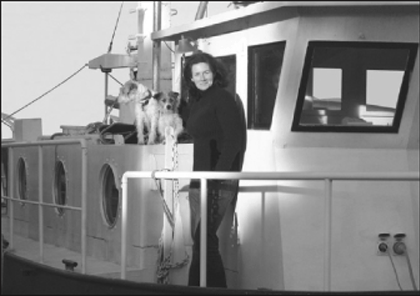By Sarah Norris
Several years ago, Mary South writes at the beginning of her memoir, “I was probably a lot like you. I had a successful career, a pretty home, two dogs, and a fairly normal life.” A founding editor of Riverhead Books, South went on to work at several other publishing houses, editing a slew of best sellers that included the immensely popular “South Beach Diet.” After abandoning Manhattan’s West Village for rural Pennsylvania — a requisite for her new job at Rodale — South found it progressively more difficult to muster enthusiasm for her vocation, or the hours away from it. Her deep malaise took different forms — for one, all of her food began to taste the same — and at age 40, she found herself asking whether this was all there was to life. If so, she concluded after yet another corporate meeting, she “had nothing to lose.”
As it turned out, what she did have to lose was the blues — a midlife case of bourgeois depression that left her drinking a bit too much in the evenings, by herself, and obsessively reading magazines about everything from current events to home design to the world of yachting. And just like that, she woke up from her suburban nine-to-five existence and smelled the possibility of the unknown, at sea.
By shucking off her job, house, and electric espresso maker (unwillingly, after discovering that “only 12-volt appliances work when you’re away from the dock”), South went all-in to risk taking the reins of her own happiness, and well being. First, she bought a 40-foot, 30-ton steel trawler named the “Shady Lady,” which she immediately rechristened the “Bossanova.” Then, she enrolled in a school of seamanship to learn how to operate, care for, and direct her new home.
South’s self-deprecating sense of humor and clear, easy writing style make this a fast read. She deftly interweaves the story of her boating life, namely a post-sea-school-graduation period of two weeks during which she and a classmate travel in the “Bossanova” from Florida to New York, with stories from her past. In addition to anecdotes about her eccentric family, South recounts episodes from her spotty romantic history. She makes no secret, in life and in writing, of her lesbianism, which underscores how blindsided she is at the end of her Atlantic journey to find herself in bed and in love with a man. The affair doesn’t end with a happily ever after, but that’s beside the point.
Of all the lessons South gleaned aboard her ocean trawler, the one that resonates most is about living in the here and now. She travels into the eye of a storm that lashes her for two hours, and emerges, thankful for her survival, with a real sense of peace. South doesn’t stand upon a steel-hulled soapbox and condescend to the reader by posing as someone who has all the answers, or even that all of her greatest life’s desires have been quenched by her days at sea. The value of this book lies in South’s voice, the honesty of which is very appealing.
Here is a woman who went through life, one foot in front of the other on the same career path for decades, accruing all the material things she thought would fulfil her. Once they she stopped making her happy, South let go of them, and chose the road — or rather, the sea — less travelled by. By raising the stakes and consequences of her day-to-day decisions, South effectively chose to live her life fully.



























